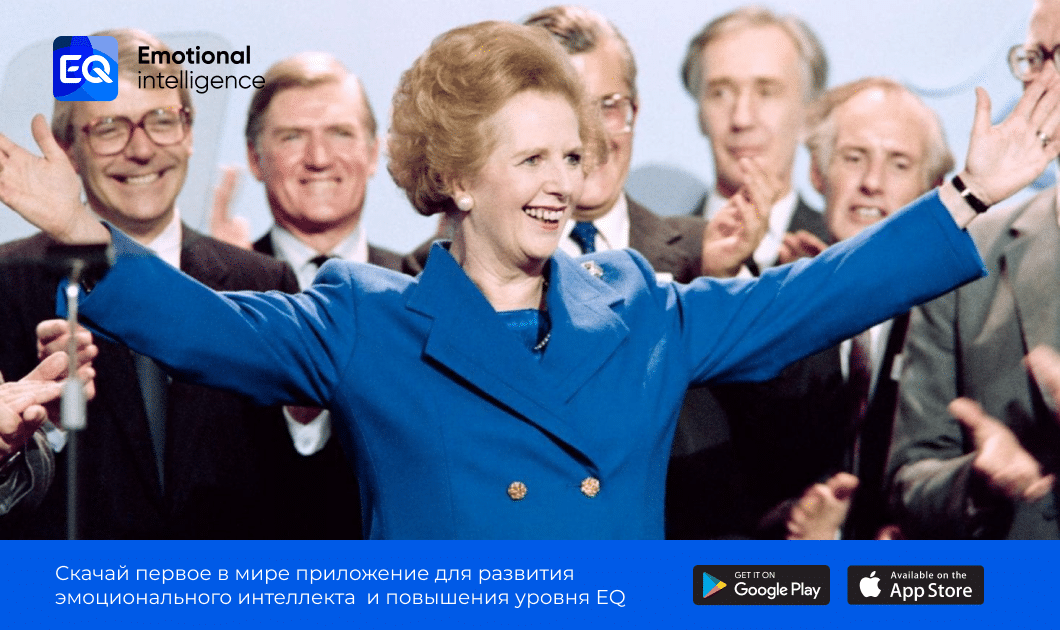Margaret Thatcher – Prime Minister of Great Britain in 1979-1990, the first woman in this post in Europe, carried out many reforms in politics and economy. For her harsh and conservative measures, she received the nickname “Iron Lady”. This woman became an outstanding figure in world politics, transformed England from a crisis state into a leader. Margaret Thatcher was at the head of state for 11 years. She has become a role model with a high level of emotional intelligence.
From an early age, Margaret learned to be aware of thoughts, emotions and actions. Although her family was strictly traditional, her father raised the girl with an unconventional approach. He cultivated in her more masculine qualities, such as detachment, firmness, confidence, desire to achieve, while other girls were raised with an inclination towards softness, suppleness, preparing for secondary roles, motherhood and keeping the home. Studying in schools for girls, Margaret was distinguished from others by her firmness, invincibility, determination. The absence of boys reinforced this role and made it even more familiar.
The father always taught his daughter to act out of the ordinary, make efforts and rely less on circumstances. To take the situation into their own hands. Margaret was a very diligent student, she read a lot and was inspired by politicians and constantly improved herself. I even wrote poetry for some time. But instead of showing sensuality, her poems already read the ability to manipulate words.
The career of a politician began with a strong desire to get into parliament, while Margaret was still working as a chemist in one large company. She joins the Oxford University Conservative Party Association and soon she is already running for parliament in Dartford County. A young, extraordinary and single woman is attracting more and more attention in political circles. She confidently moves to the top of the government, in 1979 she becomes Prime Minister of Great Britain. They call her the first lady. She is conducting tough work to stabilize the country’s economic sphere. This requires a lot of effort of will, strength of character, emotional endurance.
Those who lingered in Margaret’s office a little longer said that she often said, “We will do this because it’s right!”. That is, she was inherent in the understanding that there was no need to explain the arguments, because she influences with her will and affects emotions. Lenin and Hitler acted in the same way, imposing their own line, repeating very often easy-to-understand statements.
This situation also speaks of emotional intelligence. Once at the hotel where she was staying with her husband, IRA terrorists detonated a powerful bomb. Margaret, without unnecessary emotions, first made sure of her husband’s safety, then even managed to take care of the hotel staff. Emotionality, so inherent in women, here faded into the background.
In her tenure, Margaret followed the assigned political course, of course passing through difficult obstacles. Like the invasion of the Falkland Islands by the Argentine army. Thatcher was taken by surprise: “I never expected the Argentines to attack the islands, this is very stupid.” Emotional composure allowed her not to get lost in her own thoughts, but to act. Thatcher said: “I don’t negotiate with thugs. The Falkland Islands are British and I want them back.” Firmly, cutting off other options for decisions coming from her colleagues, Margaret immediately gave an order to the commander-in-chief of the army and launched a process to protect the islands. A risky woman, however, because it was very courageous to wage a war now, when the economy was already going through hard times. This undermined the budget, but she did not want to give the land under any pretext. After 2 months, the Falkland Islands were again under British control.
Thatcher always understood what she was doing when she applied to politics. And the strength with which she coped with the difficulties and tasks of the chapter was powerful and not suppressed.
Year 1984. The city is noisy with demonstrations of confrontation between miners. These people, having the main source of income as mining, are now losing it, because the authorities came to the conclusion to rationalize the work of the coal industry. The mines were closed, which became unprofitable. Thatcher is a very smart and strategically thinking woman, remembering the mistakes of her predecessors, she was ready for such confrontations: “I do not intend to retreat from the mission to make our country prosperous, even by implementing such harsh measures to reduce costs!” In advance, she made sure to make supplies of coal in case of protests, so that the rebels could not paralyze the work of the power plants. It was the largest labor protest in England and for Thatcher it also meant a symbolic character, because she believed that the strikers were “internal enemies”, and the task of the Conservative Party was to strengthen the country at all costs. Thatcher was very strict and decisive in her actions; she did not seek compromises. The soldiers were disguised as police officers in order to avoid unnecessary things.


Recent Comments